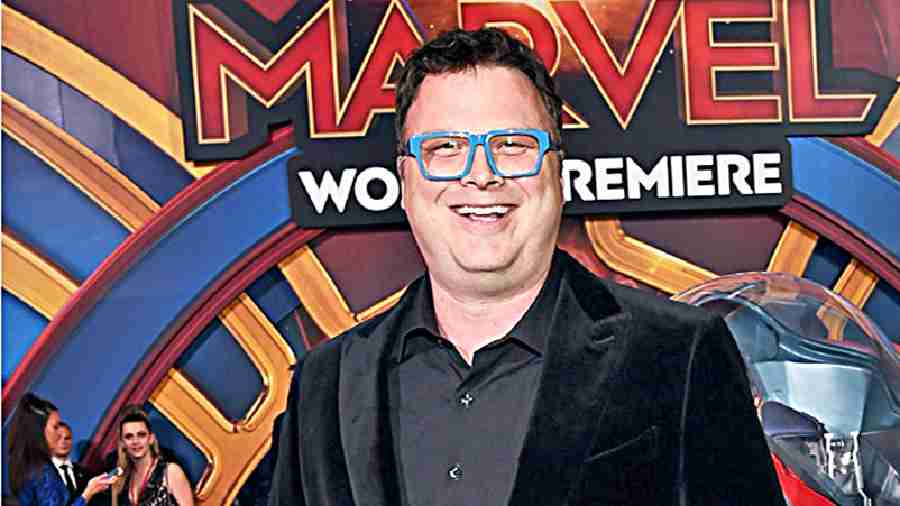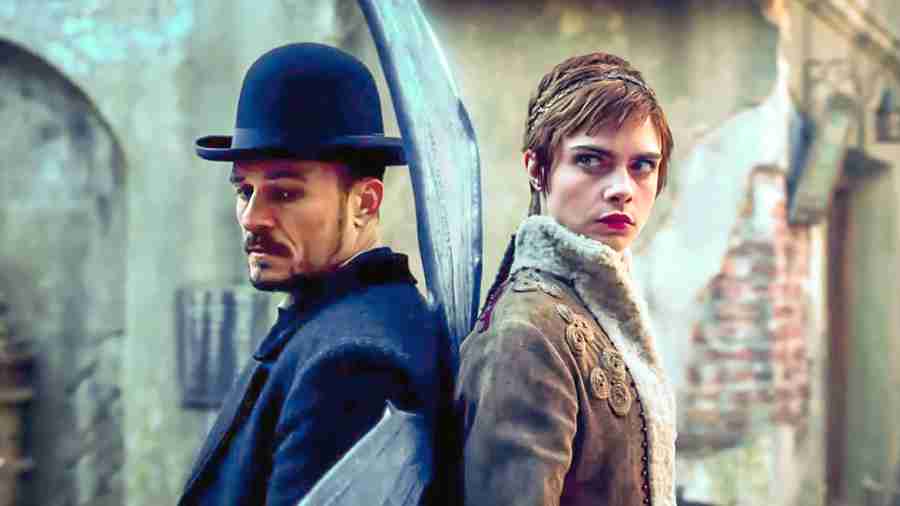Season Two of neo-noir fantasy television series Carnival Row premiered on Amazon Prime Video last weekend. The fantasy saga, headlined by Orlando Bloom and Cara Delevingne and comprising a strong ensemble of actors, has Erik Oleson functioning as its showrunner, who has the task of bringing the steampunk fantasy series to its epic conclusion.
Oleson, who was also the showrunner on the critically-acclaimed third and final season of Marvel’s Daredevil and the head writer and executive producer of the highly praised The Man in the High Castle chatted with TT over video call on the challenges and creative highs of making Carnival Row S2 and what fantasy filmmaking means to him.

Erik Oleson
What do you think made Season One of Carnival Row so popular that it helped greenlight a second season?
The fact that it was such an inventive, lush world was a big part of that. The cast was remarkable. Orlando (Bloom) and Cara’s (Delevingne) performances were so mesmerising that people really wanted to see more of the show. It was such an inviting world full of possibilities that I think a lot of people were curious about ideas that were introduced in Season One and they wanted to know more.
Coming into Season 2 as showrunner demands that you bring in some freshness but also retain the essence of the first season of the show. How did you achieve that balance?
The tightrope of that was to ensure that I gave the chance to every character to shine and every great talented cast member to shine. The way I started Season 2 was by rolling out a controlling idea of whether we are defined by our DNA or are we defined by the way that we behave and the choices that we make in life. That was the positive message that the writers and I wanted to put out into the world and to also have the different storylines refract in different ways.
The architecture of the story in Season Two is completely new but is built to top the end of Season One. The new season takes the characters in interesting new directions and gives the cast new things to play with. All the while, it delivers and even builds on the epic elements of fantasy and creatures and sweeping vistas and action and the rollercoaster ride that the audiences really enjoyed in Season One.
What were the creative challenges of putting together the second season?
Well, I am sure you have heard that one before, but the biggest challenge was, of course, Covid. Covid kind of rained on everyone’s parade! (Laughs)
But that was kind of negated by the highs that we all felt in the writers’ room, the chills we felt when someone came up with a great idea and we said, ‘Wow, that’s so cool! We can’t wait to film it’. And when we started filming, just walking around the sets and seeing the scope of the production, getting to see the work of people I grew up watching and then realising that suddenly I am the one who is getting to tell a story... that was a creative high.
Working with the Czech crew was beyond anything that I had ever seen... their craft and their craftsmanship. That was kind of stunning to me. And then going into post-production... one of my favourite moments as a creator is like watching an orchestra... walking in and thinking that these artistes are making music to something that I thought of and then wrote on a whiteboard two years ago. That’s a pinch-yourself moment for any creator or showrunner.
Is every project as exciting as the first? Do you retain this childlike enthusiasm in everything that you do?
Have you been talking to my mom about my behaviour... what’s going on?! (Laughs) I have always been very enthusiastic but now I am also the guy who gets to choose the story. I have never been cursed with becoming jaded or cynical about the process. Making huge productions with a crew of 1,500 people and a cast of 100-plus always has its challenges. But the process is so fun when you get to work with such nice and talented people that the end result is a reward in itself.
I loved working on Marvel’s Daredevil and running that show, and I think that showed up on screen. It did show that I was in love with what I was doing. I am hoping some of those Marvel fans say, ‘Hey, what’s Erik up to now? Let’s take a look.’ All I have to say is that I put in Daredevil’s Jay Ali and Joanne Whalley in Carnival Row Season 2, so check it out Daredevil fans! It’s pretty freaking cool’ (Laughs)
With the fantasy genre now getting pretty crowded, what’s the key to standing out?
A lot of shows in the genre have fallen into the trap that it’s about the scale and the scope and the sweeping epic nature. All that is, of course, important but most important is connecting to characters on an emotional journey where the audience can live vicariously through the adventure, imagining themselves in a scenario which the characters that they are watching on screen are going through.
Personally, for me, in the big, epic sweeping fantasy genre, it’s the quiet moments between two characters that the viewer is really concerned about... a quiet space where they are having a meaningful conversation... that speaks louder than a huge spectacle. That’s a lesson that I brought to Marvel’s Daredevils because I was never impressed by the larger-than-life spectacle. You could always cut out a musical piece from a story and that would hardly change it. For us, in the writers’ room on Carnival Row, we made sure that every time there was a huge scene that involved spectacle, then it had to have a direct bearing on a character’s journey,
What differentiates great fantasy from mediocre spectacle is whether you actually have an idea that you are exploring or are you just throwing VFX at the wall and hoping that the audience will be wowed by it. Then I think it has no soul. If one gets to the core of what are we saying and why are we saying it and when I am pitching an obscene amount of money on a sequence to the network, then I should be able to say what kind of a change it will bring into the life or the character arc of Vignette (played by Cara Delevingne) or Philo (Orlando Bloom). I need to justify why it is money well spent.
My idea never has been to outdo another show that spent a million bucks on a fantasy sequence. I don’t particularly like that kind of storytelling. Thinking that lighting money on fire is cool... that’s not how I go about things.
And yet the core of fantasy does lie in spectacle. Is it sometimes heartbreaking, especially after creating a jawdropping visual sequence, that many in the audience will watch it on their mobile phone screens?
That’s just the nature of the device. If you have the phone close to your eyes and you have good resolution, then the amount of space that you are watching is as big as the size of the television screen that you are seeing from your couch. If you think of the geometry of it, if you have your mobile screen right in front of your eyes, then you will get a good visual. But I will take everything... if you want to watch with one eye closed, then also just come and watch the show! (Laughs)

